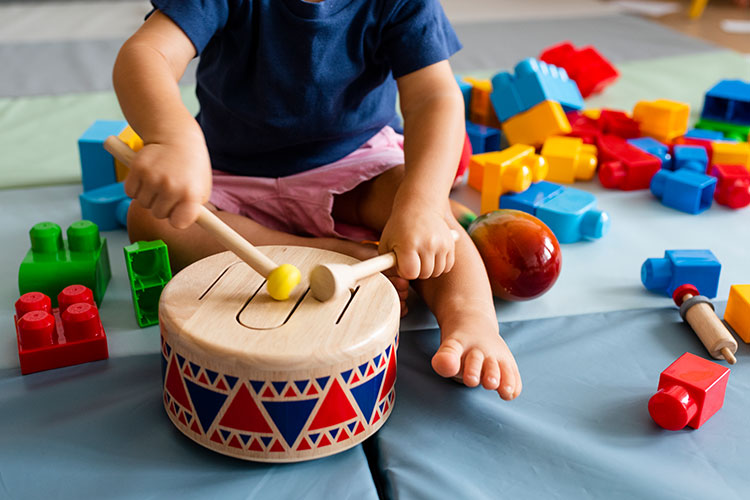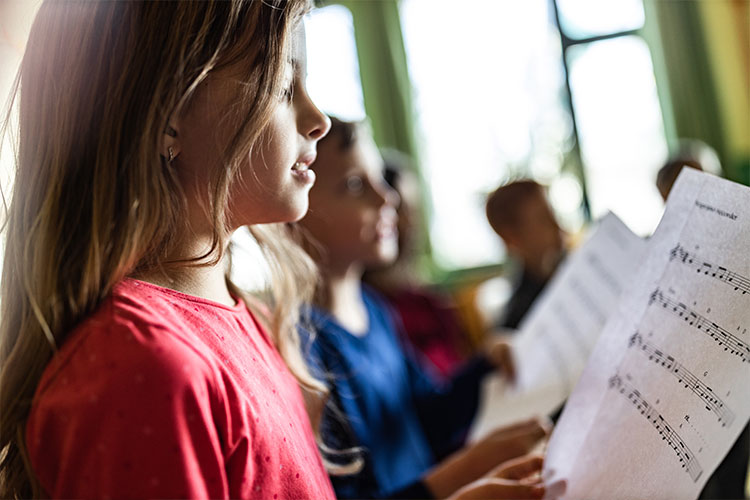If you’re looking to improve your child’s cognitive, emotional, behavioural, motor and social skills, then music is one of the best tools you have access to. Listening to songs, singing and dancing together also provide wonderful opportunities for a parent or caregiver to bond with their child, which is crucial to a child’s early development.
Here are some simple, evidence-based ideas about how music can help children learn and grow.
Dance to develop gross motor skills
Busting out some dance moves with your child is such a great way to connect with them and have an activity you can look forward to participating in together. It also helps non-verbal communication development, like eye contact and understanding body language and gestures.

Action songs work amazingly well with toddlers and younger children. Combining music with dance and movement gets those muscles moving, as well as develops balancing skills and bilateral coordination. There are plenty of songs targeting different body parts and movements, like “Head, Shoulders, Knees and Toes” and “Incy Wincy Spider”. These kinds of songs also benefit vocabulary, memory, listening skills, rhythm and keeping count.
Music can play a role in mood and emotional regulation
Try using music to help your child learn and express their emotions. For example, try singing: “If you’re happy and you know it, clap your hands,” or “if you’re angry and you know it, cross your arms.” This is a fantastic song to model to your child because it will help them understand how to express themselves with the associated emotion, boosting their emotional intelligence at an early age.
Drumming is an excellent way for children aged around six and seven to express and release feelings of extreme happiness or even anger. It also helps to relieve stress and anxiety.

And there’s playlists, which are one of the best approaches to self-regulation. There are so many apps that have playlists for different moods, seasons, and occasions. Listening to a happy, energetic song on a rough day can uplift one’s mood. At the same time, listening to music that matches one’s emotions has a soothing, comforting effect. In music therapy, we use different elements of music to alter the physiological and emotional state, especially in children who struggle to do it by themselves.
The benefits of singing
Singing songs can help children build their communication, listening and attention skills. Moreover, when it is your child’s favourite song, they’ll likely be motivated to participate in the activity.

While singing with your child, you can work on their communication skills by leaving off the last word or phrase. This anticipation and prompting approach will help encourage your child to sing the missing word, so they can get to the next line of the song. For example, sing: “Twinkle-twinkle little ___ ?” and wait for your child to finish the line before moving on to the next.
Offering song choices to your child also encourages independent decision making. For example, use a picture of ducks (for “5 Little Ducks”) or ABC (for the alphabet song) and ask your child to point to the one that they want to sing with you.
Use music to help build social skills and self-esteem
Participating in group musical activities can help a child develop important social skills, including waiting to take their turn, appreciating other people’s choices, and following instructions.

You can practise social skills with a simple activity like “Follow the leader,” where a family sits in a circle holding different percussion instruments. Let each group member take turns being a leader by playing or tapping their instrument, and the whole group plays back the same beats on their instruments. You don’t need any fancy instruments – rattles, egg shakers, tambourines, maracas or even toy drums at home will do. Who knows, you may also indirectly be harnessing the musical potential of your child.
To find out more about Music Therapy at The Benevolent Society, call our friendly Support Centre at 1800 236 762 or visit our page here.